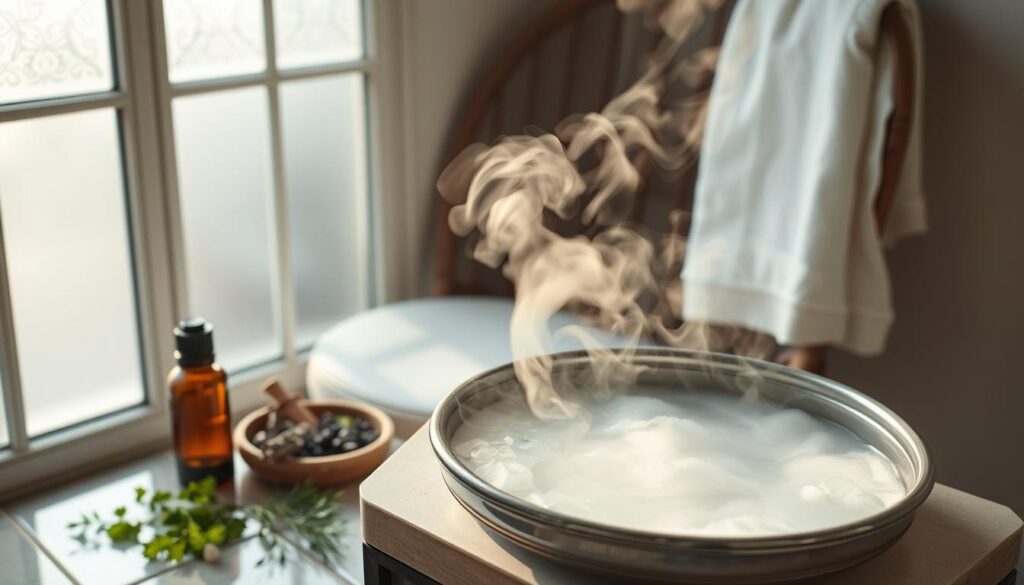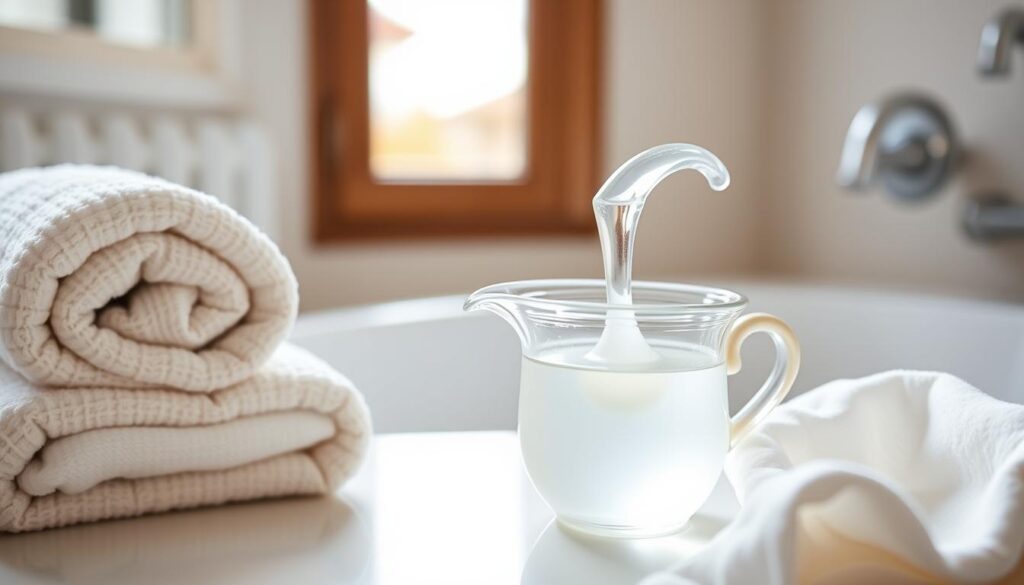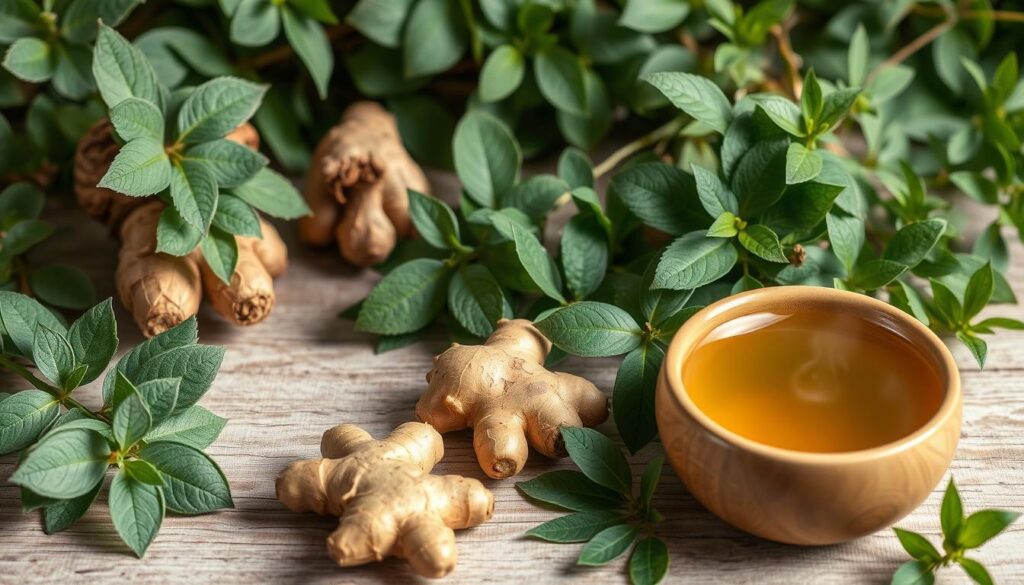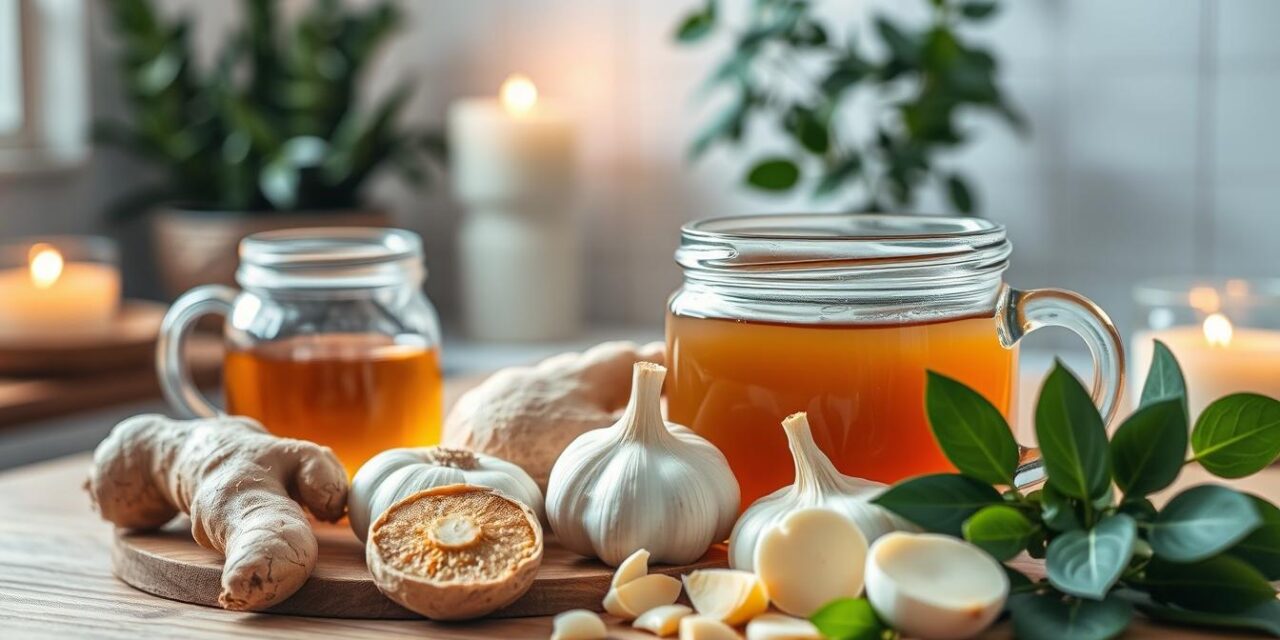Sinus infections, or sinusitis, are common and can be frustrating. Before buying over-the-counter meds, try natural home remedies. This guide will show you the best natural ways to fight sinus infections. You’ll learn how to use common ingredients and methods to feel better.
Key Takeaways
- Understand the difference between acute and chronic sinusitis and their common symptoms
- Discover the effectiveness of steam inhalation for sinus congestion relief
- Learn how to properly use a Neti pot and make homemade saline solutions
- Explore the benefits of herbal teas and essential oils for sinus-related issues
- Identify anti-inflammatory foods that can help combat sinus infections
Understanding Sinus Infections and Their Symptoms
Sinus infections, or sinusitis, are a common health issue. They can make daily life uncomfortable. Knowing the symptoms and the difference between acute and chronic sinusitis is key to managing them.
Common Signs of Sinusitis
The signs of a sinus infection include:
- Persistent nasal congestion and sinus pressure
- Thick, discoloured nasal discharge
- Difficulty breathing through the nose
- Reduced sense of smell and taste
Sinus pain and headaches
Differentiating Between Acute and Chronic Sinusitis
Sinus infections can be acute or chronic. Acute lasts less than 4 weeks, while chronic lasts 12 weeks or more. Knowing the type is important for treatment.
Risk Factors and Triggers
Some factors increase the risk of sinus infections, such as:
- Allergies and environmental irritants
- Weakened immune system
- Structural abnormalities in the nasal passages
- Chronic underlying conditions, such as asthma or diabetes
Understanding symptoms, the difference between acute and chronic, and risk factors helps manage sinus health. It also guides seeking the right treatment.
Essential Steam Inhalation Techniques for Sinus Relief
Looking for natural ways to ease sinus congestion? Steam inhalation is a powerful remedy. It uses warm, moist air to soothe your nasal passages and loosen mucus. Adding essential oils like eucalyptus makes it even more effective.
To do a steam inhalation, fill a big bowl with hot water. Lean over it, covering your head with a towel to keep the steam in. Breathe deeply, letting the vapour warm your sinuses. For extra help, add a few drops of eucalyptus oil to the water. It can reduce swelling and open your airways.
- Boil a pot of water and carefully pour it into a large, heat-safe bowl.
- Lean over the bowl, keeping your face about 12 inches away.
- Drape a towel over your head to trap the steam.
- Breathe deeply through your nose, allowing the warm, moist air to soothe your sinuses.
- For added decongestant benefits, add 2-3 drops of eucalyptus oil to the water.
- Continue the steam inhalation for 5-10 minutes, or until you feel relief.
Be careful with steam inhalation as hot water can burn you. Make sure the water isn’t too hot and keep a safe distance. With caution, steam inhalation can safely ease sinus congestion.
| Technique | Benefits | Precautions |
|---|---|---|
| Steam Inhalation with Eucalyptus Oil |
|
|
Using steam inhalation and eucalyptus oil can help with sinus congestion. It improves your breathing. Always be safe and listen to your body when trying this method.

Saline Solutions and Neti Pot Applications
Neti pots and saline nasal rinses are popular for easing sinus issues. They help clear mucus, reduce swelling, and improve sinus health.
Proper Neti Pot Usage Guidelines
Using a neti pot right is key for its benefits and safety. Always use a clean neti pot. Follow these steps:
- Use a warm saline solution in the neti pot. Mix purified water and non-iodized salt.
- Tip your head and put the spout in the top nostril.
- Pour the solution slowly through the top nostril, letting it come out the bottom.
- Do the same on the other side, tilting your head the other way.
- Breathe normally and don’t push the solution.
Making Homemade Saline Solutions
Make your own saline solution to save money and tailor it to your needs. Mix 1/2 teaspoon of non-iodized salt with 1 cup of warm, purified water. Stir until the salt dissolves. This solution works with a neti pot or as a nasal rinse.
Benefits of Regular Nasal Irrigation
Regular use of neti pots or saline rinses offers many benefits for your sinuses:
- It clears out mucus, allergens, and irritants.
- It reduces swelling and pressure in the sinuses.
- It helps with drainage and breathing.
- It makes other sinus treatments work better.
- It’s a natural choice instead of decongestants and meds.
Learning how to use neti pots and saline rinses can help your sinus health. They offer relief and are a natural part of your care.

Sinus Infections Home Remedy Solutions That Work
Dealing with sinus infections can be tough. But, there are many home remedies that can help. These include herbal treatments and simple lifestyle changes. They can ease your symptoms and help your body heal.
Steam inhalation is a great way to tackle sinus congestion. Inhaling steam, whether from a hot shower or a steam device, loosens mucus. It also soothes your nasal passages. This method has been around for ages, offering natural sinus relief.
Using a neti pot with saline solution is another effective option. It rinses out irritants and helps drainage. This can bring much-needed relief from sinus infections. Just make sure to use the neti pot correctly for safe and effective cleaning.
There are also herbal remedies for sinus congestion you can try. Drinking teas with ginger and turmeric can reduce inflammation and thin mucus. Other herbal blends may also offer soothing benefits.
Making some dietary changes can also help. Eating anti-inflammatory foods, staying hydrated, and avoiding irritants can boost your sinus health. These changes support your body’s fight against sinus issues.
Exploring these natural solutions can help you manage your sinus infections. You can find the remedies that work best for you.

“The key to effective home remedies for sinus infections is to address the root causes and provide comprehensive relief.”
Herbal Tea Remedies for Sinus Congestion
Herbal teas are great for natural sinus relief. They soothe the respiratory system and fight sinus infections and congestion. These aromatic brews offer many benefits.
Ginger and Turmeric Combinations
Ginger and turmeric tea is a top choice for sinus relief. Ginger reduces swelling in the sinuses. Turmeric’s curcumin fights congestion and infections. Drinking this tea can quickly ease sinus pain.
Beneficial Herbal Blends
- Peppermint tea: Peppermint’s menthol thins mucus and helps nasal drainage.
- Chamomile tea: This herb soothes and reduces sinus pressure.
- Echinacea tea: Echinacea boosts the immune system, fighting sinus infections.
Optimal Brewing Methods
To enjoy your herbal teas, brew them right. Use fresh, quality ingredients and steep for 5-10 minutes. Adding honey soothes the throat and fights infections.
Adding herbal teas to your sinus care can offer natural relief. Try ginger and turmeric, or blends like peppermint, chamomile, and echinacea. These teas provide a gentle way to manage sinus issues.

Essential Oils and Aromatherapy Applications
Essential oils and aromatherapy are great for sinus problems. Eucalyptus oil is especially good because it helps clear congestion and reduces swelling. It’s a top pick for those looking for natural ways to ease sinus pain.
There are many ways to use essential oils for sinus relief. Inhalation is very effective because it targets the nasal passages and sinuses directly. You can add eucalyptus oil to a diffuser or inhale steam from a bowl of water with the oil in it.
You can also apply essential oils topically. Mix eucalyptus oil with a carrier oil like coconut or almond oil. Then, gently rub it on your temples, forehead, and nose to ease sinus pressure and congestion.
“Eucalyptus oil has been shown to possess antimicrobial, anti-inflammatory, and decongestant properties, making it a valuable tool in the management of sinus infections and associated symptoms.”
Other oils like peppermint, lavender, and tea tree oil can also help with sinus issues. Try different blends and ways of using them to find what works best for you.
Always use essential oils safely and follow the right dilution ratios, especially if you have sensitive skin. If you’re unsure or have health concerns, talk to a healthcare professional.
Dietary Modifications to Combat Sinus Issues
Diet can help with sinus problems. Eating foods that fight inflammation and avoiding bad ingredients can help. Drinking enough water is also key for healthy sinuses.
Anti-inflammatory Foods
Some foods have natural anti-inflammatory effects. They can help reduce swelling and irritation in the sinuses. Here are some good options:
- Fatty fish, like salmon, mackerel, and sardines, are full of omega-3 fatty acids.
- Turmeric, with its active compound curcumin, is very anti-inflammatory.
- Ginger can help ease sinus congestion and inflammation.
- Berries, like blueberries and raspberries, are full of antioxidants.
- Leafy greens, such as spinach and kale, are rich in vitamins and minerals.
Foods to Avoid During Infections
Some foods can make sinus problems worse. It’s best to limit or avoid these during infections:
- Dairy products can make mucus thicker.
- Processed and fried foods can cause inflammation.
- Alcohol can dehydrate and irritate the sinuses.
- Spicy or acidic foods can irritate the nasal passages.
Hydration Recommendations
Drinking enough water is crucial for healthy sinuses. Drinking water, herbal teas, and apple cider vinegar can help thin mucus. Aim for 8 glasses of fluid a day, more if you have sinus issues.
By making these dietary changes, you can help manage sinus problems and support your sinus health.
Natural Decongestant Solutions
If you’re dealing with constant sinus congestion, natural remedies might help. You can try herbal blends or essential oils. These options can clear your nasal passages and ease sinus pressure without the side effects of drugs.
Herbal Decongestant Teas
Drinking warm herbal teas can help decongest your sinuses. A mix of ginger, turmeric, and peppermint is great. These herbs have anti-inflammatory properties that can reduce swelling and thin mucus. You can also try a tea with eucalyptus and thyme to open up your nasal airways.
Apple Cider Vinegar Rinses
Apple cider vinegar is a natural remedy that can act as a decongestant. Mix a tablespoon of it with warm water. Then, use a neti pot or nasal rinse to clear out your nasal passages. The vinegar’s acidity can break down mucus and soothe sinus inflammation.
| Natural Decongestant | Key Benefits | How to Use |
|---|---|---|
| Ginger and Turmeric Tea | Anti-inflammatory, expectorant | Steep 1-2 tsp each of grated ginger and turmeric in hot water for 5-10 minutes. Sweeten with honey if desired. |
| Eucalyptus and Thyme Tea | Decongestant, antimicrobial | Combine 1 tsp dried eucalyptus leaves and 1 tsp dried thyme in hot water. Steep for 7-10 minutes. |
| Apple Cider Vinegar Rinse | Anti-inflammatory, mucolytic | Mix 1 tbsp apple cider vinegar in a glass of warm water. Use a neti pot or bulb syringe to flush out nasal passages. |
While natural decongestants can offer relief, always talk to a healthcare professional if your sinus congestion doesn’t get better or gets worse. Getting the right treatment is crucial for managing chronic sinus problems.
Conclusion
In this article, we’ve looked at natural ways to treat sinus infections. We’ve talked about steam inhalation, saline solutions, herbal teas, essential oils, and changing your diet. These methods are great alternatives to traditional medicines.
Knowing the signs of sinusitis and the risks can help you take care of your sinuses. Using these sinus infections home remedy tips daily can help ease symptoms. It might even stop future sinus problems.
Even though these natural sinus relief methods work well, see a doctor if your symptoms don’t get better. A healthcare professional can help diagnose and treat your sinus issues. They’ll work with you to find the best mix of natural remedies and medical treatments.





